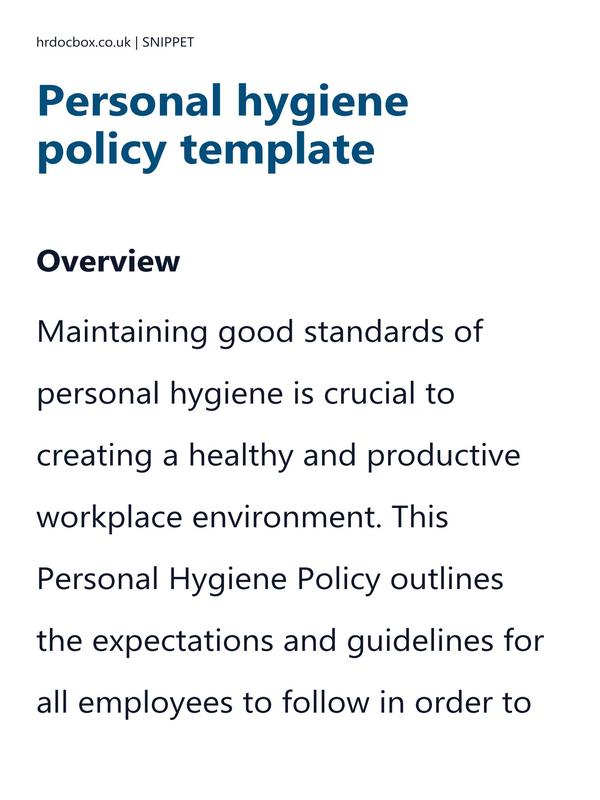Personal hygiene policy template


Personal hygiene policy template promoting workplace cleanliness, health and hygiene standards.
Our Personal Hygiene Policy promotes cleanliness and health in the workplace, ensuring employees follow guidelines for hand hygiene, respiratory etiquette, and overall well-being.
- Includes 12 months' access to the Personal hygiene policy template, with all updates provided free of charge and notified to you.
- UK-specific accuracy.
- 486 words over 2 pages.
- Last updated 24/01/2026.
- Format: Word / plain text / email.
- Delivery: Instant download after purchase (no physical item).
- Access: Download link shown here after checkout.
- This Personal hygiene policy template will SAVE you up to 1 hour 30 mins drafting & research, save you money, and reduce your risk.
Personal hygiene policy
1 Overview
1.1 Maintaining good standards of personal hygiene is crucial to creating a healthy and productive workplace environment. This Personal Hygiene Policy outlines the expectations and guidelines for all employees to follow in order to promote cleanliness, prevent the spread of germs, and ensure the well-being of all individuals within the organisation.
2 Scope
2.1 This policy applies to all employees of the organisation and covers all areas of the workplace, including offices, workstations, common areas, meeting rooms, restroom facilities, and any other relevant spaces.
3 General Principles
3.1 Hand Hygiene
3.1.1 Employees must wash their hands thoroughly with soap and water for at least 20 seconds at the following times:
-
[Before and after using the restroom.]
-
[Before and after handling food, beverages, or utensils.]
-
After coughing, sneesing, or blowing the nose.
[Hand sanitisers containing at least 60% alcohol are provided throughout
This is a 30% preview of the Personal hygiene policy template. For instant full access, purchase this item or a parent bundle.
Personal hygiene policy template purpose
The purpose of this Personal Hygiene Policy is to establish clear guidelines and expectations for employees regarding personal hygiene practices within the workplace. The policy aims to:
-
Promote Health and Well-being: By maintaining good personal hygiene, employees can minimise the risk of spreading germs and reduce the likelihood of illness among themselves and their colleagues. This policy emphasises the importance of hand hygiene, respiratory etiquette, and other hygiene practices to create a healthier and safer work environment.
-
Prevent the Spread of Germs: Proper personal hygiene practices, such as regular handwashing and respiratory hygiene, are effective in preventing the transmission of infectious diseases, including respiratory infections and gastrointestinal illnesses. By following these practices, employees can help reduce the spread of germs and protect the health of their colleagues and visitors.
-
Ensure Compliance with Health and Safety Regulations: Personal hygiene is an essential component of workplace health and safety. This policy ensures that employees understand and adhere to the hygiene standards required by relevant health and safety regulations and guidelines.
-
Enhance Professionalism and Image: Maintaining good personal hygiene is an important aspect of presenting a professional and respectable image in the workplace. By following the guidelines outlined in this policy, employees contribute to a positive and professional atmosphere.
-
Foster a Culture of Hygiene: This policy aims to establish a culture of personal hygiene within the organisation, where employees take responsibility for their own cleanliness and consider the well-being of others. By providing education, training, and reminders, the policy encourages employees to adopt and maintain good personal hygiene practices as part of their daily routine.
Overall, the purpose of this policy is to create a clean, safe, and healthy workplace environment by promoting and enforcing proper personal hygiene practices among employees.
Practical application of a Personal hygiene policy template
- Issue the Personal hygiene policy template during onboarding / after changes / planned refresher.
- Send it to appropriate internal recipients such as employees, workers, contractors etc. and request confirmation that is has been read and understood.
Compliance
Compliance
This Personal hygiene policy template incorporates relevant UK laws and HR standards, including those listed below:
-
Health and Safety at Work Act 1974: Provides a legal framework for maintaining a safe and healthy working environment, including the implementation of policies and procedures related to personal hygiene.
-
Control of Substances Hazardous to Health (COSHH) Regulations 2002: Requires employers to assess and control the risks associated with hazardous substances, including proper hygiene practices to minimize exposure.
-
Management of Health and Safety at Work Regulations 1999: Requires employers to assess and manage risks to the health and safety of employees, including the provision of adequate facilities and information on personal hygiene.
-
Workplace (Health, Safety and Welfare) Regulations 1992: Covers various aspects of workplace health and safety, including the provision of suitable sanitary facilities, clean working environments, and hygiene requirements.
-
Food Safety Act 1990 and Food Hygiene Regulations: Sets out regulations for the handling, preparation, and consumption of food in the workplace, emphasizing the importance of personal hygiene practices.
-
Equality Act 2010: Ensures that employees with disabilities or specific needs are provided with reasonable accommodations to maintain personal hygiene standards.
-
Employment Rights Act 1996: Protects employees from unfair treatment or dismissal due to health-related issues, including illness or medical conditions affecting personal hygiene.
Frequently Asked Questions about a Personal hygiene policy template
Frequently Asked Questions about a Personal hygiene policy template
-
Can I use the Personal hygiene policy template in my small business?
Yes. The Personal hygiene policy template is designed to be flexible and suitable for organisations of all sizes, including small businesses and charities. It follows UK employment law best practice, so even if you don't have an in-house HR team, you can confidently apply it.
-
Is the Personal hygiene policy template compliant with 2026 UK employment law?
Absolutely. Like the Personal hygiene policy template, all of our templates are drafted with the latest ACAS guidance and UK employment legislation in mind. We review and update them regularly, so you can be confident they remain compliant.
-
Can I customise the Personal hygiene policy template for my organisation?
Yes, we highlight the areas of the Personal hygiene policy template that you need to update with your own details, and where you need to make decisions to suit your situation. This saves you time and ensures that you meet best practice.
-
Do I get instant access to the Personal hygiene policy template?
Yes. Once purchased, you'll be able to download the Personal hygiene policy template instantly. Templates are provided in editable Word or Excel format so you can customise them easily, and in PDF format for easy sharing.
-
What if I need more help, not just a Personal hygiene policy template?
If you're looking for broader support, we also offer toolkits and library bundles that include the Personal hygiene policy template, along with other HR templates and policies for fully managing your situation. These may be more cost-effective if you need deeper advice.
-
Why should I use this Personal hygiene policy template, and not AI to generate it?
The risk of using a free AI-generated template 'without review' includes your legal exposure, missing context, and no awareness of the wider process, whereas purchasing the Personal hygiene policy template from us mitigates that risk.
